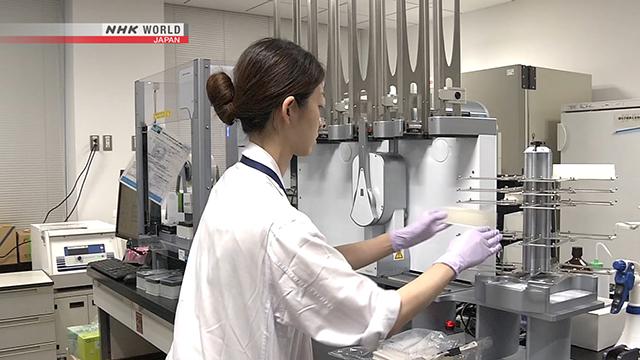To spread genomic medicine, the health ministry plans to designate about 12 hospitals across Japan as core facilities by the end of March.
Some medical institutions have already taken steps to this end. In September, a genomic medical research facility was completed at the National Cancer Center in Tokyo. It is designed to support cancer treatment and develop new remedies.
The facility features cutting-edge technology, including a partially automated device to extract genes from cancer cells and a next-generation sequencer capable of analyzing such genes at high speed. Blood samples from about 60,000 cancer patients are stored in its refrigerators, making it the largest depository in the country.
Hiroyuki Mano, the head of the National Cancer Center says, "I think genomic medicine will be used more and more in Japan. We want to promote research and support clinical medicine."
What is genomic medicine? The long-held view is that abnormality in genes causes cancer. The same type of cancer may even behave differently in different patients.
Genomic medicine tries to determine which genes are responsible, to allow doctors to choose more effective drugs. It's expected to provide the best form of treatment for each patient.
The health ministry says Japan is falling behind the United States, Europe, China and South Korea in using new technologies for cancer treatment.
On October 24th, the government approved a new plan that includes promoting the use of genomic medicine. It outlines how the government will combat the disease over the next 6 years.
Japan lagging behind in curbing passive smoking
The government's plan does not include a numerical target for eradicating passive smoking by 2020.
Health ministry officials postponed their plan to submit a bill to the Diet during an ordinary session this year to ban smoking inside buildings, such as restaurants and pubs.
The main governing Liberal Democratic Party called on the ministry to relax its standards, and the 2 sides failed to come to an agreement.
Ministry officials say they want to propose viable measures at the Diet as soon as possible, but they do not know when that will be.
About 40 percent of people who took part in a survey by the ministry 2 years ago said they were exposed to passive smoke at restaurants and pubs during a one-month period. Around 30 percent reported exposure at work.
The ministry hopes to earmark about 48 million dollars in the next fiscal year to support eating and drinking establishments as well as municipalities that plan to set up isolated smoking areas.
Expert calls for urgent action
Fumihiko Wakao, who heads the National Cancer Center's Center for Cancer Control and Information Services, says it is extremely regrettable that the government plan does not include a numerical target for curbing passive smoking. He says Japan is lagging behind other countries, and that the government should quickly set forth realistic measures to prevent unwanted smoking.
